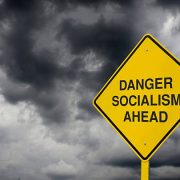Humans are imperfect beings. Try as we may, each of us is subject to some degree of inconsistency in our own thought patterns. Even the greatest champions of liberty who have made invaluable contributions to the study of classical liberalism have fallen prey to error. And while these heroes and geniuses may come to an inconsistent conclusion every now and then, our admiration continues.
Hayek wasn’t infallible. And in chapter three of The Road to Serfdom, he makes some arguments in favor of “harmless” market intervention that call for scrutiny.
No Such Thing as Harmless Regulation
As I made my way through chapter three, I did a doubletake after coming across this passage:
To prohibit the use of certain poisonous substances or to require special precautions in their use, to limit working hours or to require certain sanitary arrangements is fully compatible with the preservation of competition.”
In this chapter, Hayek regularly uses the word “competition” to mean free market. He also asserts that “planning” is, in and of itself, the enemy of competition. Hayek argues that not all state action qualifies as “planning” and as an encroachment on “competition.”
Hayek reasons that since these types of regulation do not interfere with the means of production themselves, it is fully compatible with free market capitalism. He has also argued that since these are “blanket” regulations—no one can use these substances— and not individual regulations—only this group can’t use them—they do not inhibit the market’s ability to function freely. In Hayek’s mind, for example, the state limiting the number of widgets you can produce is far more intrusive than outlawing certain harmful substances.
Those of us alive today are blessed us with the gift of hindsight. This has allowed us to recognize (hopefully) that these types of policies necessarily rig competition in favor of one group over another. In fact, when it comes to the market, there is no such thing as a neutral intervention.
The Overtime Rule that Almost Was
For example, last fall, the Department of Labor set new regulations regarding overtime pay. Concerned that the American worker was being exploited, the department declared that those earning an annual salary of $48,000 or less would only be allowed to work 40 hours a week. If for some reason more than 40 hours of work was needed, the employer would be mandated to give overtime pay.
This kind of regulatory policy was explicitly conceded by Hayek as acceptable in the abovementioned passage.
But instead of safeguarding workers, the overtime rule would have hurt their ability to get ahead in their careers. The salary threshold that the Department of Labor had agreed upon disproportionately impacted entry-level workers. Since work hours were to be limited, young professionals no longer had the ability to work long hours in order to prove their dedication to their career and improve their chances at a promotion. As Jeffrey Tucker wrote:
“To really make it in an industry, you need more than a connection and a credential. You have to show that you have the stuff. You need to demonstrate your personal commitment. And you will typically be tasked to show this while living on a low salary — not so low as to qualify for overtime but not high either.
This exemption from overtime rules is what makes the Prada economy work. It permits workers to strut their stuff without imposing new financial burdens on employers. This is what the new rules would abolish.”
This would put young workers at an unfair disadvantage relative to those who had been in the workforce longer and had already put in the hours needed to move up the corporate ladder.
In fact, so concerned was the American worker about the negative impact this new overtime rule would have on their careers, that it ended up being killed before it was enacted.
Beware of Slippery Slopes
Another problem with “benign interventions” is that the state is incapable of self-restraint. This is why so many governments fall victim to tyranny and oppression. Once those in authority are given even the slightest increase of power, they will use it as precedent and leverage to incrementally take more until true freedom exists in name only. In other words, if you give the government an inch, they will take a mile.
Mises made this same point in Human Action:
“But whoever is ready to grant to the government this power would be inconsistent if he objected to the demand to submit the statements of churches and sects to the same examination. Freedom is indivisible. As soon as one starts to restrict it, one enters upon a decline on which it is difficult to stop. If one assigns to the government the task of making truth prevail in the advertising of perfumes and toothpaste, one cannot contest it the right to look after truth in the more important matters of religion, philosophy, and social ideology.”
Such has been the case throughout history, and such will always be the case so long as governments are invited to regulate on behalf of consumers and workers alike.
This is why constant vigilance should be practiced and even “moderate” regulatory practices should be fought at every step. For even the most moderate of policies, with the most “rational” of justifications, will result in the unforeseen consequence of a controlled economy. As Mises wrote:
“All varieties of interference with the market phenomena not only fail to achieve the ends aimed at by their authors and supporters, but bring about a state of affairs which—from the point of view of their authors’ and advocates’ valuations—is less desirable than the previous state of affairs which they were designed to alter. If one wants to correct their manifest unsuitableness and preposterousness by supplementing the first acts of intervention with more and more of such acts, one must go farther and farther until the market economy has been entirely destroyed and socialism has been substituted for it.”
As Dan Sanchez has written:
“In a brilliant bit of economic reasoning in his classic essay ‘Middle-of-the-Road Policy Leads to Socialism,’ Mises showed how even such a seemingly-minor intervention as a price ceiling on milk would inevitably lead to full-blown socialism, if the government pursued it to the bitter end, and if it undertook further interventions to try to deal with all of its negative consequences, as well as the negative consequences of those and all subsequent interventions. Thus, Mises called interventionism ‘a method for the realization of socialism by installments;’ or, as we would say, ‘socialism on an installment plan.’”
Hayek understood such dangers as it pertained to the collectivist mindset. The entire second chapter of the book was dedicated to warning that all forms of collectivism necessarily lead to tyranny. We would be wise to extend this wariness to even seemingly benign forms of intervention as steps, however small, down the road to serfdom.













